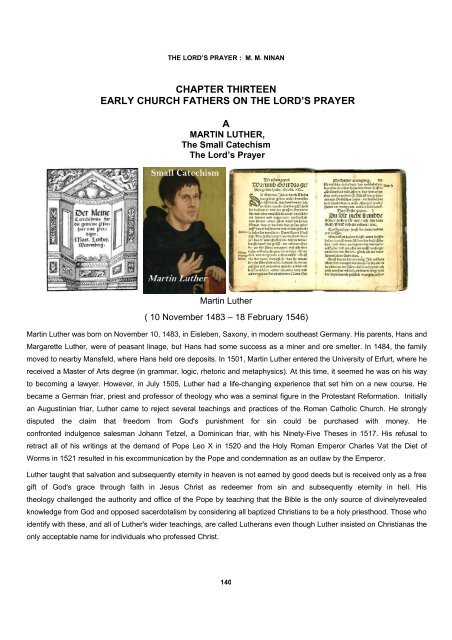Lord's Prayer
Create successful ePaper yourself
Turn your PDF publications into a flip-book with our unique Google optimized e-Paper software.
THE LORD’S PRAYER : M. M. NINAN<br />
CHAPTER THIRTEEN<br />
EARLY CHURCH FATHERS ON THE LORD’S PRAYER<br />
A<br />
MARTIN LUTHER,<br />
The Small Catechism<br />
The Lord’s <strong>Prayer</strong><br />
Martin Luther<br />
( 10 November 1483 – 18 February 1546)<br />
Martin Luther was born on November 10, 1483, in Eisleben, Saxony, in modern southeast Germany. His parents, Hans and<br />
Margarette Luther, were of peasant linage, but Hans had some success as a miner and ore smelter. In 1484, the family<br />
moved to nearby Mansfeld, where Hans held ore deposits. In 1501, Martin Luther entered the University of Erfurt, where he<br />
received a Master of Arts degree (in grammar, logic, rhetoric and metaphysics). At this time, it seemed he was on his way<br />
to becoming a lawyer. However, in July 1505, Luther had a life-changing experience that set him on a new course. He<br />
became a German friar, priest and professor of theology who was a seminal figure in the Protestant Reformation. Initially<br />
an Augustinian friar, Luther came to reject several teachings and practices of the Roman Catholic Church. He strongly<br />
disputed the claim that freedom from God's punishment for sin could be purchased with money. He<br />
confronted indulgence salesman Johann Tetzel, a Dominican friar, with his Ninety-Five Theses in 1517. His refusal to<br />
retract all of his writings at the demand of Pope Leo X in 1520 and the Holy Roman Emperor Charles Vat the Diet of<br />
Worms in 1521 resulted in his excommunication by the Pope and condemnation as an outlaw by the Emperor.<br />
Luther taught that salvation and subsequently eternity in heaven is not earned by good deeds but is received only as a free<br />
gift of God's grace through faith in Jesus Christ as redeemer from sin and subsequently eternity in hell. His<br />
theology challenged the authority and office of the Pope by teaching that the Bible is the only source of divinelyrevealed<br />
knowledge from God and opposed sacerdotalism by considering all baptized Christians to be a holy priesthood. Those who<br />
identify with these, and all of Luther's wider teachings, are called Lutherans even though Luther insisted on Christianas the<br />
only acceptable name for individuals who professed Christ.<br />
140


















